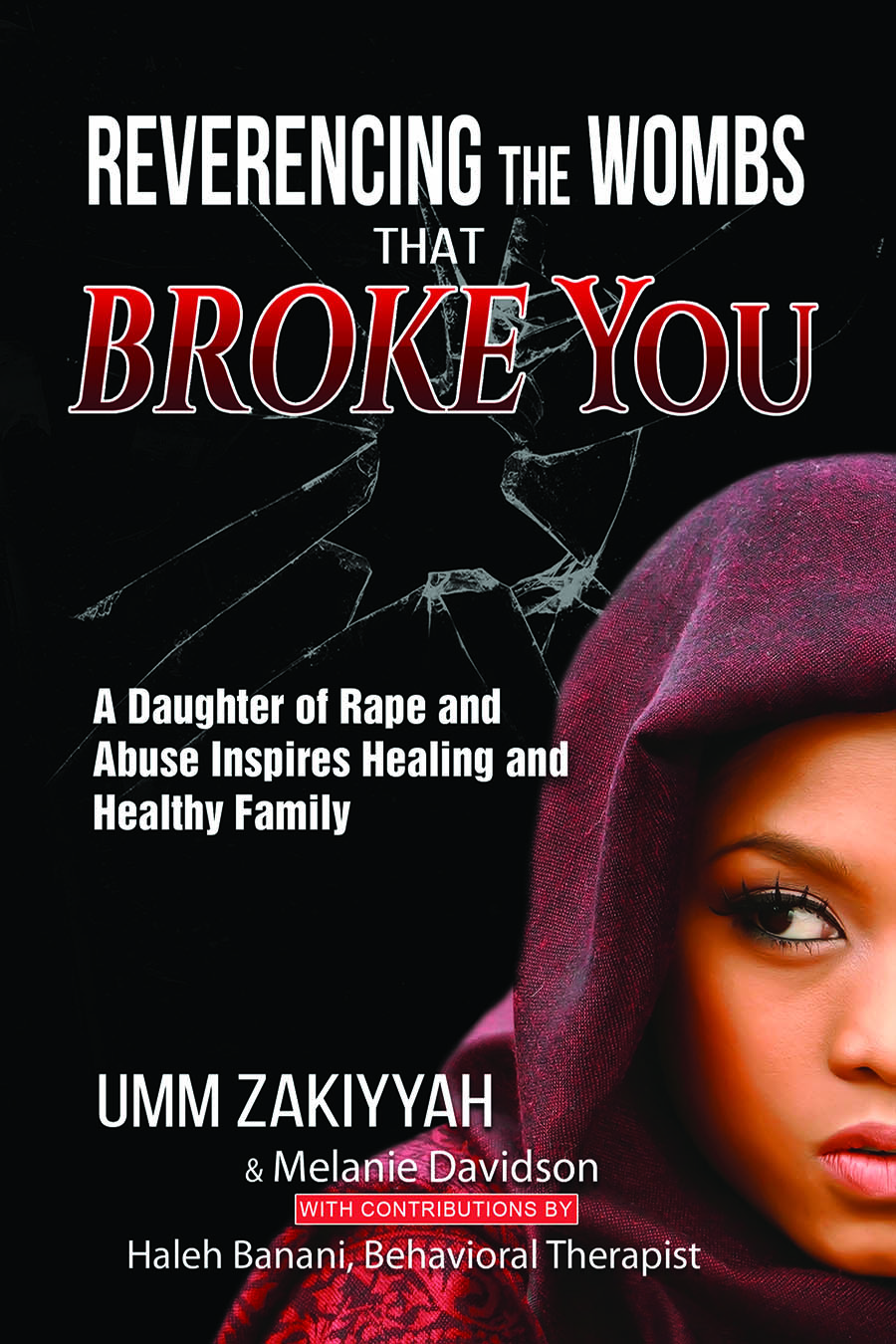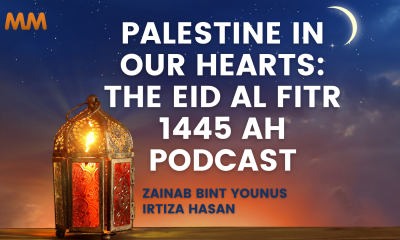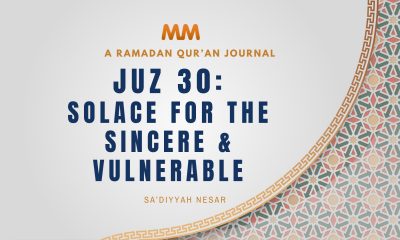#Culture
Daughter of Rape, Her Story of Surviving Trauma

Published

Melanie was verbally and physically abused through childhood. But Melanie’s obligation was to love and honor her mother, she told herself. This is what Melanie believed as a Christian, and it’s what she believed even more so after converting to Islam.
In the Qur’an, God commanded, “Reverence the wombs that bore you.” But what if those wombs broke you, and incited deep emotional trauma? What then?
Below is an excerpt from the newly released self-help book for Muslim survivors of abuse, entitled Reverencing the Wombs That Broke You. The book shares the true story of Melanie Davidson, and each glimpse into Melanie’s life is followed by commentary inspired by the words of mental health professionals, the teachings of divine texts, and the experiences of abuse survivors themselves.
Keep supporting MuslimMatters for the sake of Allah
Alhamdulillah, we're at over 850 supporters. Help us get to 900 supporters this month. All it takes is a small gift from a reader like you to keep us going, for just $2 / month.
The Prophet (SAW) has taught us the best of deeds are those that done consistently, even if they are small. Click here to support MuslimMatters with a monthly donation of $2 per month. Set it and collect blessings from Allah (swt) for the khayr you're supporting without thinking about it.
Melanie
My mother was raped by my biological father. I learned this when I was too young to understand what any of it meant. But I’m not sure I was ever meant to learn it. My mother gave me away not long after I was born. I suppose she knew from the start that seeing my face would be a constant reminder of the sexual assault she endured from her assailant. From what I understand, he wasn’t a complete stranger to my mother, but he may as well have been. He was a distant work acquaintance, but it wasn’t on the job that their paths crossed in a way that would change my mother’s life forever, and mark the beginning of mine.
As it turns out, my mother and her assailant took the same route home on the metro rail that connected the main parts of Washington, D.C. It was amidst this entanglement of the metro map’s red, orange, blue, green, and yellow lines that the man who forcibly became my biological father stalked my mother. Day after day, he quietly watched her from afar, perhaps planning his attack long before my mother took any significant notice of his presence. After all, what was there to notice? He, like she, was simply taking the metro rail home from work.
I don’t know where the crime happened or when. That bit of information was never revealed to me. Till today, the story remains choppy, and I’m not sure I want to know the parts that are missing. The little I do know has been enough to throw my entire life into confusion, and I still find myself scrambling to make sense of it. I have sometimes wondered if my life would have been better had my mother been able to be rid of me, as she originally planned. How would it have been, I’ve wondered, if my grandmother had continued to be my guardian?
Perhaps I shouldn’t call her my grandmother, because she is not, at least not in the technical, familial sense of the term. But I’m not sure I’ll ever understand what the term family means to those who define it based on love and blood alone, as if the two concepts always come together in a neatness disturbed only by hotheadedness and human choice—and restored only by the quelling of pride and the utterance of a sincere apology.
“That’s not your daddy!”
I was only three years old and recently restored to my mother’s care when my stepsister screamed these words at me. I don’t know what prompted the outburst. Maybe we’d had a disagreement and I’d said I was going to tell Daddy, or something about Daddy, and that was enough to send my sister into a fit of rage. She was ten, or maybe eleven, at the time, and naturally, she knew more than I did about the circumstances surrounding my birth. But until that moment, I’d had no idea that the man she called Daddy had no blood relation to me.
At three years old, you don’t understand family dynamics, so in my young mind, the man who was taking care of us was my daddy, just like my mother was my mommy. Of course today, I know that he was my stepfather, the man my mother married after giving birth to me.
“You don’t have a daddy!” my sister continued to scream. “We don’t know who your daddy is! That’s my daddy!”
I still remember how I’d run to my mother to report what my sister had said. I was hurt and upset not only by my sister’s words but also by her having broken a lamp over my head. I was crying and bleeding when I stood before my mother and told her what my sister had said. Ironically, at that moment, I viewed my sister’s insulting words as the greater crime. But I’d assumed even these were just amongst the many daily insults that my sister inflicted upon me since I arrived in the home. It didn’t occur to me that there was any truth to them.
“He’s not your daddy!” my mother responded in obvious annoyance. It was as if her disgust with me surpassed even my sister’s. I stood in utter confusion, holding my bleeding head as my young mind tried to understand what I’d done to make my mother so upset. “Your father raped me!” she said.
These words were shouted as if she were really saying, “You already ruined my life, now leave me alone! I don’t want to even look at you!” I had no idea what the word rape meant, but there was a place deep inside of me that imbibed these unspoken words more viscerally than if my mother had spoken them aloud.
When I was in high school, I wrote a poem entitled “love me” after I realized that my mother wasn’t well or in any position to love herself, so how could she begin to love me? The poem was me imagining how she must have felt. She had just told me that after the initial rape, her assailant followed her home one evening then broke into her home and attacked her again with the intention of making sure she was not pregnant. She had permanent hearing damage as a result of that assault. I survived that attack, so she did protect me. My mother has always loved me as best as she could. And I will always respect and appreciate her intention and constant struggle to be my mother.
Blood Ties
“You don’t choose your family. They are God’s gift to you, as you are to them.” —Desmond Tutu
The term family, perhaps for good reason, is effectively a sacred term. So it is naturally difficult to fathom it representing something unholy. In this, I think there is little distinction between the religious and the non-religious regarding how they view the subject. The whole of the world seems to agree that there is something phenomenal, if not miraculous, in the bond of blood.
However, stories like Melanie’s draw into question how we traditionally understand the “ties of the womb.” In a perfect world, a man and a woman come together by choice, and when a child is conceived, it is the culmination of two people willingly sharing a cherished moment of intimacy.
It is perhaps cliché to say that we do not live in a perfect world. But that does not make the implications of this oft-repeated sentiment any less profound. We do not live in a perfect world, and I believe we have yet to grasp the depth of meaning in what appears to be a rather obvious point. But our understanding of the meaning of “family” illustrates this disconnect quite significantly.
On the most basic level, the term family means only that two or more people are connected through a shared bloodline or through a man and a woman officially committing to each other in marriage. Any other meaning that we attach to the word is rooted in the concept of obligation, expectation, or assumption, not in its actual definition. While it is not necessarily wrong to view family through any of these lens, equating these concepts with the very meaning of family can prove extremely problematic, particularly for people in abusive, toxic, or dysfunctional family situations. As a real-life example, I think Melanie’s family makes this point undeniably clear.
Q&A with Haleh Banani, Cognitive Behavioral Therapist
Some Muslims suffered abuse from parents or other family. What should they do for healing?
Haleh Banani: Firstly, you have to be very patient with yourself. You are in a lot of emotional pain, and there are no shortcuts to healing. However, everyone is different, and I have seen individuals work through this trauma in different ways. Many survivors feel stuck and don’t know how to cope. Some overcome this pain by reading self-help books, engaging in honest introspection, and tending to those parts of themselves that they know need work. However, other people require professional help to get over this obstacle.
But regardless of how victims of abuse work through this difficult trial, it is very important that they allow themselves to grieve over what happened to them. Allowing this grieving process is very important, and it requires a lot of patience. When survivors don’t allow themselves the opportunity to grieve, they often try to suppress their emotions and deny the negative experiences. This never works, and it is never healthy…
UZ: What happened in these families? What went wrong?
HB: Part of the problem is that we raise our children to be unconditionally obedient. We tell them, “You have to listen to your elders and do what you are told.” Unfortunately, our children are not trained from early on about inappropriate behavior, which can come from some of the same elders we’re teaching them to obey without question. So naturally, when children encounter inappropriate behavior from elders, the only thing they know is the obligation to obey and be submissive.
What I find tragic is that nearly every single person whom I’ve encountered who has ever been abused, tells me that they were never informed about creating boundaries with elders. So we must inform our children. We must empower them to take action when they see, experience, or sense that something is wrong. We need to teach them that we are not going to punish them if they tell us something bad about an elder, a family member, or anyone else they generally trust and respect. Our children need to understand that they are not going to get in trouble for speaking up. This is how we can help prevent these situations from happening…
Keep supporting MuslimMatters for the sake of Allah
Alhamdulillah, we're at over 850 supporters. Help us get to 900 supporters this month. All it takes is a small gift from a reader like you to keep us going, for just $2 / month.
The Prophet (SAW) has taught us the best of deeds are those that done consistently, even if they are small. Click here to support MuslimMatters with a monthly donation of $2 per month. Set it and collect blessings from Allah (swt) for the khayr you're supporting without thinking about it.
Daughter of American converts to Islam, Umm Zakiyyah, also known by her birth name Ruby Moore and her "Muslim" name Baiyinah Siddeeq, is the internationally acclaimed, award-winning author of more than twenty-five books, including novels, short stories, and self-help. Her books are used in high schools and universities in the United States and worldwide, and her work has been translated into multiple languages. Her work has earned praise from writers, professors, and filmmakers. Her novel His Other Wife is now a short film. Umm Zakiyyah has traveled the world training both first-time authors and published writers in story writing. Her clients include journalists, professional athletes, educators, and entertainers. Dr. Robert D. Crane, advisor to former US President Nixon, said of Umm Zakiyyah, “…no amount of training can bring a person without superb, natural talent to captivate the reader as she does and exert a permanent intellectual and emotional impact.” Professor K. Bryant of Howard University said of If I Should Speak, “The novel belongs to…a genre worthy of scholarly study.” Umm Zakiyyah has a BA degree in Elementary Education, an MA in English Language Learning, and Cambridge’s CELTA (Certificate in English Language Teaching to Adults). She has more than fifteen years experience teaching writing in the United States and abroad and has worked as a consultant for Macmillan Education. Umm Zakiyyah studied Arabic, Qur’an, Islamic sciences, ‘aqeedah, and tafseer in America, Egypt, and Saudi Arabia for more than fifteen years. She currently teaches tajweed (rules of reciting Qur’an) and tafseer. In 2020, Umm Zakiyyah started the UZ Heart & Soul Care community in which she shares lessons she learned on her emotional and spiritual healing journey at uzhearthub.com Follow her online: Website: uzauthor.com Instagram: @uzauthor Twitter: @uzauthor YouTube: uzreflections


[Podcast] Palestine in Our Hearts: Eid al-Fitr 1445 AH

Foreign Affairs Official Resigns Over Gaza Genocide

A Ramadan Quran Journal: A MuslimMatters Series – [Juz 30] Solace For The Sincere And Vulnerable

IOK Ramadan: The Importance of Spiritual Purification | Keys To The Divine Compass [Ep30]

IOK Ramadan: The Power of Prayer | Keys To The Divine Compass [Ep29]

IOK Ramadan: 7 Qualities of Highly Effective Believers | Keys To The Divine Compass [Ep18]

IOK Ramadan: Choose Wisely | Keys To The Divine Compass [Ep15]

IOK Ramadan: Shake the Trunk of the Tree | Keys To The Divine Compass [Ep16]

IOK Ramadan: They Were Not Created Without Purpose | Keys To The Divine Compass [Ep23]

IOK Ramadan: Appreciating the Prophet ﷺ | Keys To The Divine Compass [Ep22]

IOK Ramadan: The Importance of Spiritual Purification | Keys To The Divine Compass [Ep30]

IOK Ramadan: The Power of Prayer | Keys To The Divine Compass [Ep29]

IOK Ramadan: The Weight of the Qur’an | Keys To The Divine Compass [Ep28]

IOK Ramadan: Families of Faith | Keys To The Divine Compass [Ep27]

IOK Ramadan: Humility in Front of the Messenger | Keys To The Divine Compass [Ep26]
Trending
-
#Islam2 weeks ago
IOK Ramadan: 7 Qualities of Highly Effective Believers | Keys To The Divine Compass [Ep18]
-
#Islam2 weeks ago
IOK Ramadan: Choose Wisely | Keys To The Divine Compass [Ep15]
-
#Islam2 weeks ago
IOK Ramadan: Shake the Trunk of the Tree | Keys To The Divine Compass [Ep16]
-
#Islam2 weeks ago
IOK Ramadan: They Were Not Created Without Purpose | Keys To The Divine Compass [Ep23]




Saharish
March 8, 2017 at 6:02 AM
Heart wrenching account! Jazak Allah khair for discussing this.
Abu Aaliyah
March 8, 2017 at 11:35 PM
JazakAllah khair for sharing. Do check out this article on the role Muslim Women play in today’s day and age.
Jean Dough
April 19, 2017 at 6:36 PM
I haven’t read your story. However, myself a Victim of Rape.
When I try to talk about it, I was told by another man, He , ( who Passionately wants me to Believe, swearing on his GOD that, He cares for me Great Deal etc. He wants my well being )..
Says to me all the time. ” Nothing Happened. It is all in your head.”
I am struggling to finding a in-between, so I can forgive all of them.